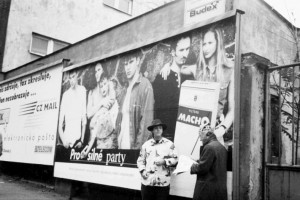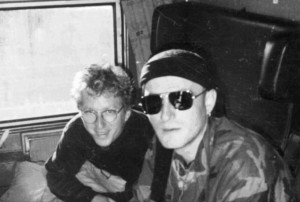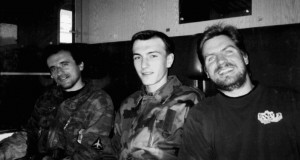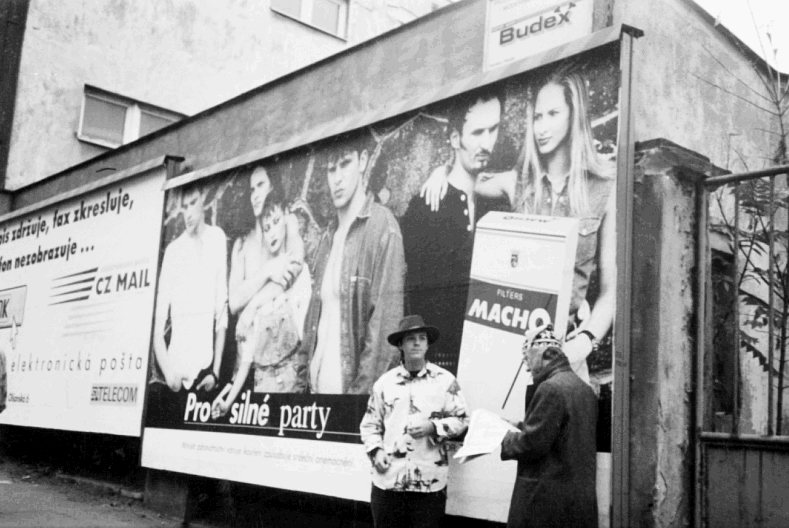Smoking and war. They must go hand in hand. Not that I know anything about war. But it appears that the two are linked in my observations. Smoking, war. War, smoking. So what happens when countries are continually at war? Its citizens smoke—a lot. What happens when everyone smokes? Maybe they go to war. But I think the rifle (or sword) came before the cigarette. Maybe its a macho thing. Smoking. War. “Look at me, I can blow SMOKE! I am a fire-breathing dragon, or a flame-belching Chimera. I will kill  you. Then I will smoke.”
you. Then I will smoke.”
Anyway, the Serbians on the train that day smoked more than any humanly possible, which may relate to why they were painted as unhuman and inhumane in their war against Muslims. We were riding the train through Serbia in the height of the so-called “Bosnian Crisis” on our way to Hungary. It was a shorter trip than through Romania, and the guys at the American embassy in Bulgaria assured us it was safe. But they didn’t say anything about smoke inhalation. On the train, the lady with the black cowl, black dress, black shoes and stumpy legs smoked. The man with a hole in his fedora and a salt-and-pepper beard smoked. The conductor checking our tickets had nicotine stains across his fingernails. Worst of all, the guy with the broom and dust pan who swept up the cigarette butts smoked. In essence, the train smoked. My traveling companions—Mike and Dean—found an empty train compartment, and I chose another, since I wanted to stretch out and try to sleep off a cold. My compartment merely reeked of past smoke, but at least it was smoke free in the present. I crawled into my sleeping bag and passed out to the rickety-rack of the tracks and the pungent smell of tobacco. When I awoke, I noticed that I was once again inhaling smoke. I surfaced from my cocoon and squinted at an elderly man and woman on the seat opposite me. Both, of course, were smoking. They smiled a greeting and smoke poured from their mouths, between their brown teeth. It lifted across their faces like a heavy fog rolling into their flesh and settled in all their facial crevices. The fog clouded their eyes, crawled back in their noses, whirled around their ears….I had to get out. I gathered my sleeping bag, also smiling, and mustered a cheerful wave good bye just as they were lighting the next link of their chain. It was still the dead of the morning, around 3 a.m., so I figured I would try to crowd in next to my buddies for some more sleep. But I found them already crowded, both sitting opposite each other with uniformed men on either side.
Three of the four soldiers in their cabin were smoking. “D’Amico!” Dean yelled. Then he coughed. “Meet our new friends.”
One of the soldiers with a black head band and black sunglasses leaped up and offered his hand. “You American too?” He screamed smoke.
“Yes, yes, I think so.”
“Ahhhhh.” More smoke. He took a drag and mumbled stumbling English. “I love Americans.”
“You don’t have to live with them,” I said.
“Ahhh. Smoke?” He held out his pack, with only one left.
“No thanks, I just had a pack.”
“No?”
“No, no thank you.” Seeing that I wouldn’t be smoking, the soldier without a cigarette lit one.
“How was your sleep?” Mike asked.
“Smoky,” I said.
“Yeah,” he said, rubbing his eyes with knuckles. “I had this dream that I was…smoking.”
“You don’t say.”
 I quickly learned all of the Serbians names, then forgot them. Although the one with the black head band either kept calling himself Rambo or talking about Rambo, so I called him “Rambo.” The soldiers were all heading to Belgrade for some reason. Only Rambo and another spoke English. The other two merely smiled at everything and pulled out a cigarette pack now and then to offer us one. Rambo proceeded to show us a scar he had, then a big knife, then a scar he said he got from a big knife. Then he told us he had shot down a plane, although it was hard to understand how.
I quickly learned all of the Serbians names, then forgot them. Although the one with the black head band either kept calling himself Rambo or talking about Rambo, so I called him “Rambo.” The soldiers were all heading to Belgrade for some reason. Only Rambo and another spoke English. The other two merely smiled at everything and pulled out a cigarette pack now and then to offer us one. Rambo proceeded to show us a scar he had, then a big knife, then a scar he said he got from a big knife. Then he told us he had shot down a plane, although it was hard to understand how.
One of the soldiers had a plane patch on his fatigues, but who knows what that meant.
“It wasn’t an American plane, was it?” Mike asked.
“Ahhh, very good planes, Americans.”
“Yes, and very good cigarettes,” Mike said.
“Yes, good cigarettes. American cigarettes”
At one point, I tried to interject a question about Bosnia, but Rambo merely shrugged his shoulders, as if not understanding. The others mimicked him with their own shrugs and puffs. “Cigarette?”
“No thanks.” I decided to switch the topic from war to smoking. “How many packs of those things do you smoke a day.”
“Huh?”
“How many cigarettes do you smoke…each day?”
“I have many cigarettes. You want one?”
“No, no thanks. I meant how many can you smoke.”
“I can smoke many…want to see?”
He started pulling out another cigarette to light in conjunction with the one dangling from his mouth, but I quickly grabbed his arm and motioned “never mind.” One more cigarette would break the camel. As the wee morning wore on, I wondered if they would ever run out of cigarettes. Fortunately, they pulled out a bottle of cheap whiskey and passed it around. Eventually, I fell asleep again and was jostled awake by Rambo and the other soldiers grabbing their bags to leave. They waved good byes with smokes in their hands
“America!” Rambo shouted. “Belgrade,” I thought. Piles of ashes littered the train floor, as if a volcano had sprinkled the train with fallout through the night. The smoking sweeper came to clean up and gently brushed the soot and butts into his pan, then let his lit cig drop from his mouth into the collection. As the train rolled on, I thrust my head out the window for fresh air and looked across the Serbian countryside at the stacks of hay and tilled fields. A farmer in the distance was swinging a scythe. He smoked as he toiled.
 (Originally published on November 8, 1996, in the Boerne Star.)
(Originally published on November 8, 1996, in the Boerne Star.)

